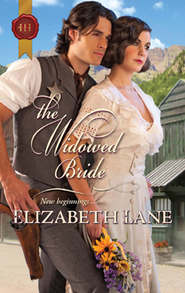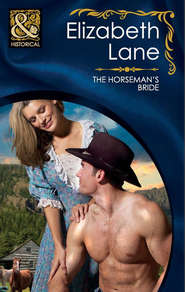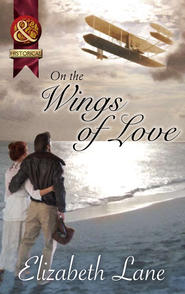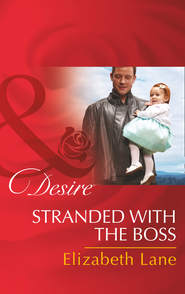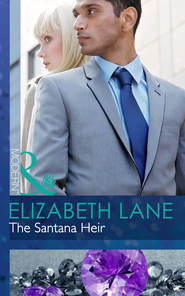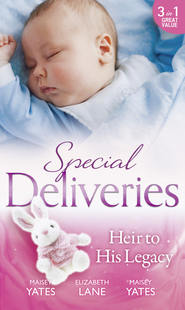По всем вопросам обращайтесь на: info@litportal.ru
(©) 2003-2025.
✖
Wyoming Widow
Настройки чтения
Размер шрифта
Высота строк
Поля
Unfolding the paper, she ripped off the front page and began crumpling it to stuff into the stove. Suddenly her hands froze. Her eyes stared at the page.
There, smiling at her from beneath the headline, was the lean, handsome face of her late husband.
Cassandra’s knees went watery. She stumbled back to the bed and sank down on the mattress, her hands smoothing the creases out of the page as her disbelieving eyes scanned the headline: Rancher’s Son Missing, Feared Drowned.
She stared at the printed picture—a pen-and-ink drawing that some newspaper artist had copied from a photograph. Of course, it wasn’t really Jake. She had seen Jake dead in his coffin. But it was someone who looked uncannily like him.
Straining her eyes in the scant light, she struggled to make out the small print beneath.
“Ryan Tolliver, son of Wyoming Rancher Jacob Tolliver, was declared missing and presumed drowned last week when a dory containing his possessions washed ashore on the banks of the upper Yellowstone River. Tolliver, 23, had been completing a survey for the United States Department of the Interior, and was last seen alive on…”
Cassandra held the paper to the window, squinting in an effort to finish the article in the fading light. But it was becoming too dark to read the fine print, and she was loath to waste her one precious candle. The picture, however, was still visible in the semi-darkness. Only as she studied the handsome young face again did Cassandra realize she had seen Ryan Tolliver before—right here in Laramie at the Union Pacific Hotel.
It had been last November, she recalled, just a few weeks before Jake’s death. She’d been mopping the foyer when the tall young man strode in through the double doors, wearing chaps, spurs and a thick coating of snow and trail dust. Even then, Cassandra had been struck by his resemblance to her late husband. But she’d had no more than a few seconds to stare before he disappeared upstairs. Half an hour later he’d come down again, washed, clean shaven and looking even more like Jake than before. Whistling an airy tune, he’d walked out the front door and headed straight for Flossie’s House of Blossoms across the street. That was the last she’d seen of him.
But now, as she studied the picture in the paper, Cassandra had no doubt that the man she’d noticed months ago was Ryan Tolliver.
Smoothing the wrinkled page, she laid it on the table, then turned to fill the kettle from the water bucket. She had not really known Ryan Tolliver, but the sense of his loss weighed on her spirit. He had seemed so happy that winter evening, so young and strong and vital. Cassandra could well imagine what the Tolliver family must be going through now as they waited for the news that would end all their hopes.
Crumpling a back page from the paper, she stuffed it into the dark belly of the stove, added two sticks of wood and lit a single match. Shadows danced on the moldering walls as the fire flickered to a steady blaze. Cassandra put the kettle on the open burner to heat. Then she turned back toward the open shelf to find the store of chamomile she kept in an old jelly jar.
Only then did she notice the way the fire flickered through the grate, casting a finger of golden light across the low table—a finger of light that pointed straight toward the smiling image of Ryan Tolliver.
Could it be a sign?
Cassandra stared at the picture, the tea forgotten as a plan sprang up in her mind—a plan so audacious and risk-fraught that only a woman in her desperate state would have thought of it.
For the space of a long breath she hesitated, weighing the idea. It was dangerous. Worse, it was dishonest, even cruel. No, she resolved, her grandparents hadn’t raised her to be a cheat and a liar. She simply could not do it. She would live on the street first!
And the street was exactly where she was headed.
Cassandra sagged against the table, her hands clenching into tight fists. Blast Jake Logan anyway! Why had he gone to the saloon on that awful December night? Why had he gotten himself shot in that silly fight over a dance hall floozy instead of just coming home to her?
But then, she’d asked herself that question too many times not to know the answer. She wasn’t beautiful like the women in that painted and perfumed world. She was small and wiry to the point of scrawniness, with a rag-doll mop of cherry-colored curls and freckles that popped out at the barest touch of sunlight on her skin. Worse, she’d never known the right words to say to a man—words that would make him puff up his chest and feel like a hero. She was as blunt and honest as the grandmother who’d raised her, and if more vinegar than honey fell from her tongue, so be it. Pretense was not in her nature.
Maybe that was the reason Jake hadn’t treated her better. When he wanted to, he could be sweet and tender. But sometimes, especially when he’d been drinking, he could be downright mean. Cassandra had hoped the baby would change things. But on the very night she’d planned to share her news, Jake Logan had died. He had died with his pants down in a tawdry upstairs room, never knowing he was to be a father.
Deep in her body Cassandra felt a little flutter kick, then a shifting motion as her baby turned and stretched in its warm, secret world. Wonder flooded her heart as she smoothed the apron over the growing bulge, feeling for the tiny life that pulsed and stirred beneath her hands. Soon she would have a child, a sweet baby all her own to love and care for. Heaven willing, she would never be alone again.
But what could she offer this child? A safe home with food on the table? The closeness and joy of a family? A secure future with the promise of a fine education?
Cassandra choked back a whimper of despair. She had nothing to offer her baby except love. To provide the rest, she would sacrifice anything—her own pride, her own life.
But even in her desperation, she could not imagine carrying out the wild scheme that had lodged in her mind. To take advantage of a grieving family would compromise everything she knew to be right and good. She would never be able to look at her own reflection in the mirror without a spasm of self-loathing.
No, it was out of the question.
All the same, the story of Ryan Tolliver’s disappearance was intriguing. Cassandra could not resist wanting to know more.
The newspaper article lay on the table, begging to be read. Strangely agitated, she rummaged for another match and lit the candle she’d been hoarding. The story took up just two printed columns. She would only need a few minutes of precious light to read it.
Placing the candle where its light would fall on the open page, she finished making the tea. Then, cradling the chipped white cup between her hands, she sank onto a wooden box and began to read.
The room was a blanket of darkness around her, the tea warm and comforting in her belly. By the time she reached the second column of the news article the print had begun to blur. Cassandra’s eyelids drooped lower and lower. She had been up since dawn looking for work, and she was tired. So very tired…
Startled, she jerked awake. The candle had guttered to half its original length. She had dozed off, Cassandra realized groggily. What time was it? What had awakened her?
As she leaned forward to blow out the candle, plunging the room into full darkness, she heard the low metallic click of a key sliding into a lock.
Instantly wide-awake, she sprang to brace the door. It crashed open, knocking her to one side as Seamus Hawkins lurched across the threshold.
“Awright, girlie.” His voice was slurred, and his body stank of cheap whiskey. “I’m back t’ finish what we started. No need t’ fight me, now. You’ll start likin’ it once I git it ’twixt them sweet little legs o’ yours.”
Cassandra had been thrown back against the wall. As he stumbled toward her, she groped for a weapon, anything she could use to defend herself.
Her hand closed on an iron bootjack with a weighted base—a silly extravagance, she’d called it when Jake had brought it home, as if a man couldn’t pull off his boots with his own two hands. It was heavy and solid, but not long enough to keep Seamus at a distance. Her best chance lay in keeping away from him until she could reach the door and flee into the night.
Hoping to confuse him, she picked up a tin cup from the counter and tossed it across the room. It clattered in the darkness, bouncing against a table leg and onto the floor. Distracted, Seamus swung toward the sound, allowing Cassandra a split second to change her position. Not that it made any difference. He still stood between her and the door.
She shrank into a shadowed corner of the tiny cabin. The mica panes on the door of the stove glowed like little red eyes, giving the darkness a hellish cast. And it would be hell if he caught her. Being raped was unspeakable enough, but if he should hurt her baby, her darling…
Cassandra’s grip tightened on the bootjack. She could hear the rasp of breath in her throat—the breath of a hunted, desperate animal.
Seamus must have heard it, too, for he suddenly turned, blocking the light of the stove as he lumbered straight toward her. “I got you cornered now, you little hellcat!” he wheezed. “Now, I won’t mind if you put up a fuss. A good rasslin’ match gits me as hard as a—”
Cassandra flung the bootjack at his head with all her strength. It glanced off his forehead, doing only superficial damage, but the blow was enough to throw him off balance. As he reeled backward, out of control, one foot landed on the tin cup that had rolled to the middle of the floor. For a split second his legs splayed wildly. His arms flailed like berserk windmills. With a shriek, he pitched backward.
Cassandra heard the awful crunch of bone as the back of his head struck a corner of the iron stove. Then Seamus Hawkins crashed to the floor and lay still.
Chapter Two
Morgan Tolliver stood on the porch of the sprawling log-and-stone ranch house. His raven eyes, a legacy from his Shoshone mother, narrowed as they studied the afternoon sky.
Virga. That’s what they called the phantom rain that hung below the clouds, vaporizing in the heat before the drops could reach the ground. His eyes could see rain, his nostrils could even smell it. But he knew this ghost rain would do nothing for the sun-parched land. There would be no relief today from the searing drought that had turned the rich Wyoming grass to straw and the water holes to dust wallows.
Even the reservoir, which, two months ago had been filled with runoff from the spring snow melt, was getting perilously low. Once the water was gone, there’d be no way to irrigate the new hayfields he’d planted to keep the cattle fed over the next winter.
Everything, it seemed, had gone bad since the news of Ryan’s disappearance. Morgan’s long brown hands tightened on the porch rail as he thought of his spirited young half brother—laughing, reckless Ryan, the darling of the ranch and the apple of their aging father’s eye. During his growing-up years, the boy had dogged Morgan’s footsteps like an adoring puppy. It was Morgan who had taught him to swim and wrestle, Morgan who had put him on his first pony and helped him rope his first calf. Now Ryan had vanished, and it was as if his loss had sucked the life out of the earth itself.
Why in God’s name did it have to be Ryan? Morgan asked himself for perhaps the hundredth time. Why not me instead?
He was turning to go back inside when a faint plume of dust on the far horizon caught his eye. Someone—or something—was moving along the road, toiling its way toward the house.
Morgan’s heart contracted as he watched the dust materialize into a dark shape that looked more like a wagon than a single rider. Could it be someone with news about Ryan—or Ryan himself? Or would it turn out to be nothing more than a wandering stranger in need of a meal and a bed?
“Who is it? Can you tell?” His father had come out onto the porch, his chair rolling across the planks on silent wheels. Jacob Tolliver had aged in the three weeks since word of Ryan’s disappearance had reached the ranch. His face was drawn, his hands and voice unsteady. He spent his days seated at the tall parlor windows, watching the empty road with his field glass, which he now thrust into Morgan’s hand. “Your eyes are sharper than mine. Take a look. Tell me what you see.”
Morgan raised the glass to his eye and trained the lens on the road. He could make it out now—a weather-beaten buckboard that lurched through the ruts on its wobbling wheels, looking as if every yard gained might be its last. A single spavined mule staggered along in the traces, favoring a lame right fore-foot. The whole sad conveyance was so thickly coated with dust that it looked like a ghost apparition emerging through shimmering waves of heat.






